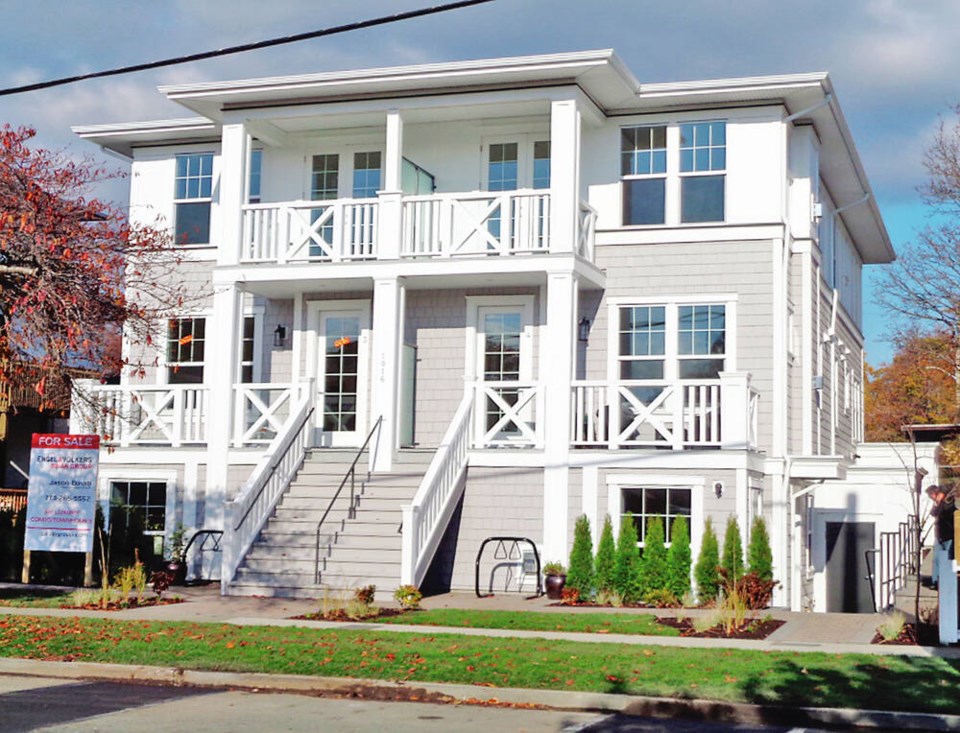Rather than see its missing-middle housing initiative die, Victoria’s city council voted Thursday to refer it to the next council.
As it became evident the initiative would be defeated at council Thursday afternoon, Mayor Lisa Helps amended a motion initiated by Coun. Ben Isitt that would send the debate to be reconsidered after the fall election, set for Oct. 15.
“It’s with regret that I put this referral motion on the table, so that at least the next council can start with all of the insights that have been gained from the public over these past three years,” said Helps.
The initiative, which aims for a streamlined approval process to increase the number of housing options in the middle ground between single-family homes and apartment or condo towers, has been the subject of 12½ hours of public hearings over three days in the last two months.
The initiative requires amending bylaws, land-use procedures and official community plans to permit infill, houseplexes and corner townhouses where zoning currently only allows for single-family homes, and would allow houseplexes as well as townhouse projects on assembled land.
It would also allow city staff to greenlight permits for projects that comply with all design guidelines and zoning without having to get council approval. Advocates believe that will mean projects are done more quickly and at a lower cost.
Helps said the next council will have to consider the proposal in the context of expected provincial legislation forcing municipalities to speed up the process of approving new housing.
The provincial government is drafting legislation that could force municipalities to increase housing options through a number of measures, including taking zoning approval out of municipal hands.
Earlier Thursday, Helps and other councillors argued the missing-middle initiative might be enough to convince the province Victoria is doing its part to deliver housing more quickly.
Helps said referring the proposal to the next council was not her preference, but the alternative was to allow it to be defeated, which would be “short sighted.”
During the public hearing it became clear the city was split down the middle on the initiative, the largest overhaul of the city’s residential zoning process ever undertaken.
Coun Marianne Alto, who supports the missing-middle proposal, voted against referring the matter, saying much of the debate Thursday had focused on finding compromise in order to enact the initiative — council had agreed to amend the zoning bylaws to reduce the size of some missing-middle housing options and to add some affordability measures.
“I’m disappointed to think that a referral matter is the next step in compromise,” she said.
Alto said the city remains thousands of units short of meeting the need for housing, despite its attempts to tackle the problem. “Continuing on an agenda which just does more of the same is not going to allow us to move forward in any meaningful or timely way to try and address those gaps.”
She said the initiative, which has been in the works for more than two years, “has been analyzed and has been taken apart and dissected and amended today. That tool, though everyone admits is not perfect, is another way forward.”
Coun. Jeremy Loveday, who was leaning toward voting for approval, also opposed referring the motion.
“This matter was a strategic priority of this council and it’s been multi years worth of work to get us to this day today where we’re finally making a decision and I think we should make a decision.”
Coun. Ben Isitt, who suggested a number of amendments with the goal of adding an affordable-housing element to the package, ultimately favoured referring the program.
“Rather than plowing ahead, I think it’s worth seeing what could be done and having the new council very early in its term send an improved version of missing middle to a public hearing.”
Coun. Geoff Young, who was poised to vote against the initiative, supported the referral and suggested the city has already gone to some lengths to provide new housing.
“I certainly would strongly hope that the province does not implement what’s been hinted at, which is essentially removing zoning power from municipal councils,” he said, suggesting it would reduce councils to the role of school boards, “where all the important decisions are made by the province and the school boards merely implement a few unpopular actions that they have to take to meet their budget requests.”
Also voting to refer the matter were councillors Stephen Andrew, Sharmarke Dubow and Charlayne Thornton-Joe.
aduffy@timescolonist.com

